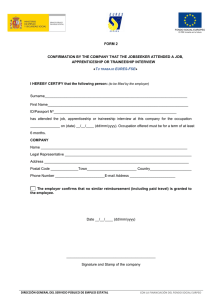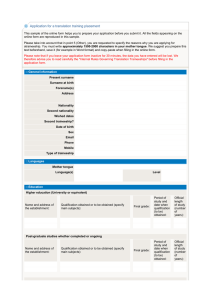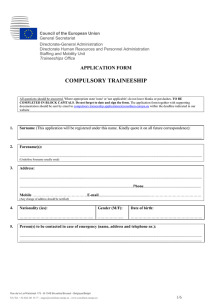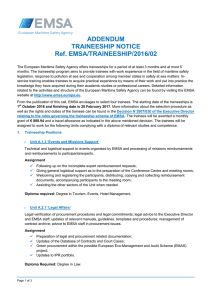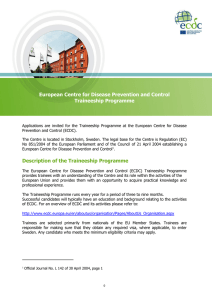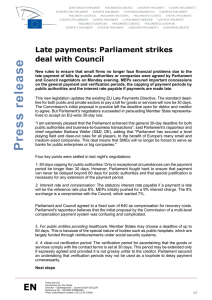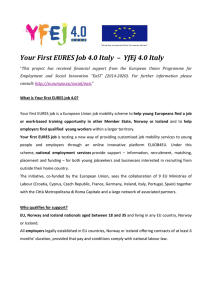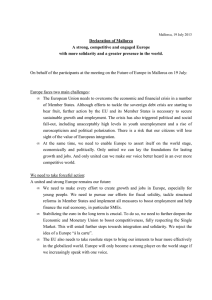Frequently Asked Questions - European Parliament
Anuncio
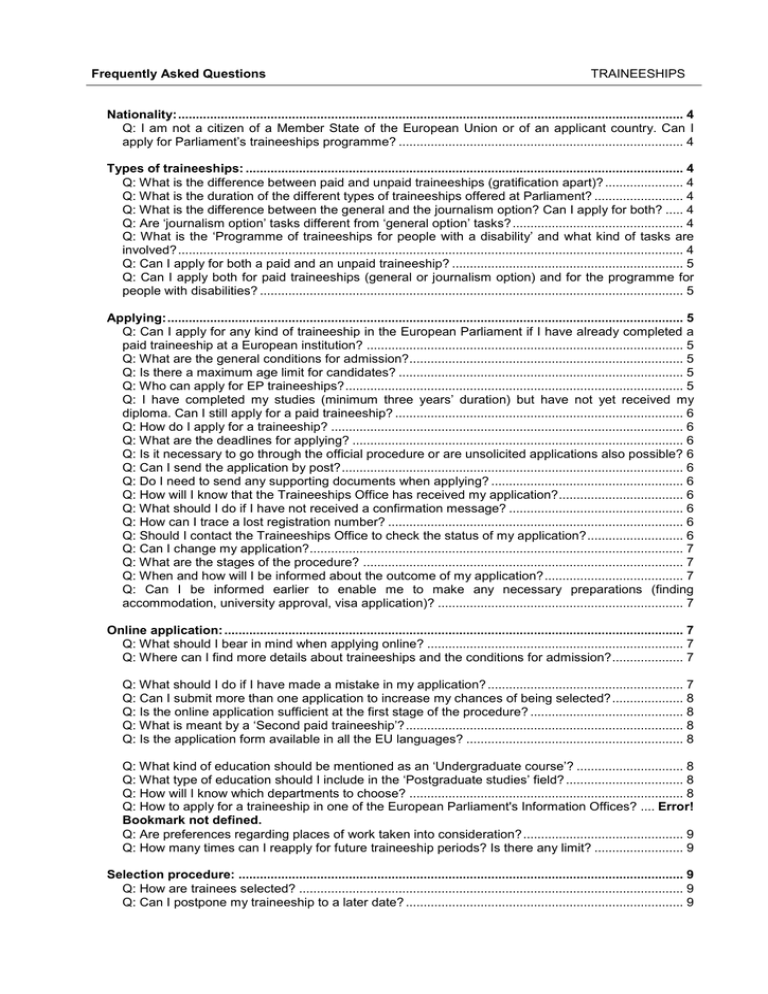
Frequently Asked Questions TRAINEESHIPS Nationality: .............................................................................................................................................. 4 Q: I am not a citizen of a Member State of the European Union or of an applicant country. Can I apply for Parliament’s traineeships programme? ................................................................................ 4 Types of traineeships: ........................................................................................................................... 4 Q: What is the difference between paid and unpaid traineeships (gratification apart)? ...................... 4 Q: What is the duration of the different types of traineeships offered at Parliament? ......................... 4 Q: What is the difference between the general and the journalism option? Can I apply for both? ..... 4 Q: Are ‘journalism option’ tasks different from ‘general option’ tasks? ................................................ 4 Q: What is the ‘Programme of traineeships for people with a disability’ and what kind of tasks are involved? .............................................................................................................................................. 4 Q: Can I apply for both a paid and an unpaid traineeship? ................................................................. 5 Q: Can I apply both for paid traineeships (general or journalism option) and for the programme for people with disabilities? ....................................................................................................................... 5 Applying: ................................................................................................................................................. 5 Q: Can I apply for any kind of traineeship in the European Parliament if I have already completed a paid traineeship at a European institution? ......................................................................................... 5 Q: What are the general conditions for admission? ............................................................................. 5 Q: Is there a maximum age limit for candidates? ................................................................................ 5 Q: Who can apply for EP traineeships? ............................................................................................... 5 Q: I have completed my studies (minimum three years’ duration) but have not yet received my diploma. Can I still apply for a paid traineeship? ................................................................................. 6 Q: How do I apply for a traineeship? ................................................................................................... 6 Q: What are the deadlines for applying? ............................................................................................. 6 Q: Is it necessary to go through the official procedure or are unsolicited applications also possible? 6 Q: Can I send the application by post? ................................................................................................ 6 Q: Do I need to send any supporting documents when applying? ...................................................... 6 Q: How will I know that the Traineeships Office has received my application?................................... 6 Q: What should I do if I have not received a confirmation message? ................................................. 6 Q: How can I trace a lost registration number? ................................................................................... 6 Q: Should I contact the Traineeships Office to check the status of my application? ........................... 6 Q: Can I change my application? ......................................................................................................... 7 Q: What are the stages of the procedure? .......................................................................................... 7 Q: When and how will I be informed about the outcome of my application? ....................................... 7 Q: Can I be informed earlier to enable me to make any necessary preparations (finding accommodation, university approval, visa application)? ..................................................................... 7 Online application: ................................................................................................................................. 7 Q: What should I bear in mind when applying online? ........................................................................ 7 Q: Where can I find more details about traineeships and the conditions for admission? .................... 7 Q: What should I do if I have made a mistake in my application? ....................................................... 7 Q: Can I submit more than one application to increase my chances of being selected? .................... 8 Q: Is the online application sufficient at the first stage of the procedure? ........................................... 8 Q: What is meant by a ‘Second paid traineeship’? .............................................................................. 8 Q: Is the application form available in all the EU languages? ............................................................. 8 Q: What kind of education should be mentioned as an ‘Undergraduate course’? .............................. 8 Q: What type of education should I include in the ‘Postgraduate studies’ field? ................................. 8 Q: How will I know which departments to choose? ............................................................................. 8 Q: How to apply for a traineeship in one of the European Parliament's Information Offices? .... Error! Bookmark not defined. Q: Are preferences regarding places of work taken into consideration? ............................................. 9 Q: How many times can I reapply for future traineeship periods? Is there any limit? ......................... 9 Selection procedure: ............................................................................................................................. 9 Q: How are trainees selected? ............................................................................................................ 9 Q: Can I postpone my traineeship to a later date? .............................................................................. 9 Frequently Asked Questions TRAINEESHIPS Q: Can I defer my acceptance of the traineeship to a future intake? In other words if I am selected can I wait until a later period before completing the traineeship? ........................................................ 9 Q: Can my traineeship be extended? If so, for how long? ................................................................... 9 Q: Would it be possible to find out why my application was rejected? Do you compile lists of candidates’ scores? ............................................................................................................................. 9 Q: Can I obtain feedback on my application to increase my chances for the next round?.................. 9 Q: Would you be able to specify the weaknesses identified in my application (e.g. my qualifications and experience or the units’ inability to accommodate trainees)? ....................................................... 9 Q: Could my application be reconsidered by departments other than the two for which I expressed a preference? ........................................................................................................................................ 10 Q: I have been placed on a waiting list. What are prospects of being offered a traineeship? ........... 10 Q: Will the results of the selection procedure be published? ............................................................. 10 Recruitment procedure: ....................................................................................................................... 10 Q: What is the next stage of the procedure if I am selected? ............................................................ 10 Q: When should I send supporting documents? ................................................................................ 10 Q: Will I receive an official letter of invitation? ................................................................................... 10 Q: Will the letter of invitation be sent by registered mail? .................................................................. 10 Q: Do you need certified copies of supporting documents? .............................................................. 10 Q: Do I have to provide translations of supporting documents? ........................................................ 10 Q: Do supporting documents have to be sent by registered mail? .................................................... 10 Q: I have not yet received my postgraduate diploma. Should I send it at a later stage? .................. 10 Q: I forgot to print the application form and I no longer have the confirmation message. Will the Traineeships Office be able to retrieve it and send it to me for signing? ........................................... 11 Q: My referee is not reachable and I cannot get my reference in time. Can I provide a testimonial from another referee? ........................................................................................................................ 11 Q: What points should be covered by the testimonial? ..................................................................... 11 Q. Can I send more than one reference? .......................................................................................... 11 Q: Who could act as a referee? ......................................................................................................... 11 Q: Can a reference be sent separately from my other documents, directly by the referee? ............. 11 Q: Do I have to send copies of certificates concerning my language skills? ..................................... 11 Q: What constitutes proof of a written work? ..................................................................................... 11 Q: My studies did not conclude with a graduation essay. Can I provide any other research paper written while I was at university? ........................................................................................................ 11 Q: I have been selected for the journalism option and have a diploma in journalism. Do I also need to send published articles to prove my journalistic skills? ................................................................. 11 Q: Will I be sent confirmation that the Traineeships Office has received my documents?................ 11 Q: I got married after I applied for a paid traineeship. Would that fact be relevant should I be selected? ............................................................................................................................................ 11 Q: My place of residence has changed since I applied for a traineeship. Would that fact be relevant should I be selected? ......................................................................................................................... 12 Q: Will I sign a contract with the European Parliament?.................................................................... 12 Traineeship: .......................................................................................................................................... 12 Q: Are all trainees based in Brussels or Luxembourg? ..................................................................... 12 Q: Can I have a part-time traineeship? .............................................................................................. 12 Q: Are trainees insured? .................................................................................................................... 12 Q: What does the insurance cover? .................................................................................................. 12 Q: What is the amount of the scholarship? ........................................................................................ 12 Q: Is a traineeship considered to be employment? Will I be exempted from paying social security contributions in my home country? .................................................................................................... 12 Q: Can you provide me with names and addresses of other trainees who will be completing their traineeship at the same time as myself? ........................................................................................... 12 Q: Are trainees taken care of during their traineeship? If so, who is responsible? ........................... 13 Q: I should like to know more about the tasks covered by my traineeship programme. Who should I contact? .............................................................................................................................................. 13 Q: Does Parliament provide any kind of accommodation? ................................................................ 13 Frequently Asked Questions TRAINEESHIPS Q: Where can I stay during my traineeship? How much a month will I have to spend on accommodation?................................................................................................................................ 13 Q: Will I need a visa? ......................................................................................................................... 13 Q: What are the working hours? ........................................................................................................ 13 Q: What is my leave entitlement (in days)? ....................................................................................... 13 Q: Is there a dress code at the European Parliament? ..................................................................... 13 Q: What should I do if I fall ill during my traineeship? ........................................................................ 13 Q: Will my traineeship involve any duty travel? ................................................................................. 13 Financial aspects: ................................................................................................................................ 14 Q: Could the European Parliament cover the cost of travel from my place of residence to the place where I am to complete my traineeship? ........................................................................................... 14 Q: Will Parliament cover the costs of my daily commuting to and from work? .................................. 14 Q: Can I get any financial support if I have been offered an unpaid traineeship? ............................. 14 Q: Under what circumstances am I entitled to the household allowance during a paid traineeship? 14 Q: Do I have to pay taxes on the scholarship? .................................................................................. 14 Q: Do I have to have a bank account in the country of assignment? ................................................ 14 Q: Is it possible to obtain an advance on the scholarship on arrival? ............................................... 14 Q: Do I have to terminate my current employment for the duration of the traineeship? .................... 14 Q: Is any other grant, e.g. from university, or a pension deriving from a deceased parent considered as income?......................................................................................................................................... 14 Future employment: ............................................................................................................................. 15 Q: What are my prospects of securing employment at the European Parliament after the traineeship? ....................................................................................................................................... 15 Statistics: .............................................................................................................................................. 15 Q: How many applications does the European Parliament receive each year and how many are accepted? .......................................................................................................................................... 15 Q: How many trainees are accepted each year? .............................................................................. 15 Q: Where are trainees usually based? .............................................................................................. 15 Q: Is it easier to get a traineeship in some places than in others? .................................................... 15 Q: Are there more paid or unpaid traineeships available? ................................................................ 15 Frequently Asked Questions TRAINEESHIPS Nationality: Q: I am not a citizen of a Member State of the European Union or of an applicant country. Can I apply for Parliament’s traineeships programme? A: Yes. In accordance with Article 5 of the Internal Rules governing traineeships and study visits in the Secretariat of the European Parliament, citizens of third countries other than applicant countries may be awarded traineeships in the European Parliament, if the competent authority grants authorisation after considering their files, up to a maximum of 5% of the total number of traineeships that decides on pursuant to Article 3 of those Rules. ‘The programme of traineeships for people with a disability’ is, for the time being, limited to nationals of a Member State of the European Union or of an applicant country. Types of traineeships: Q: What is the difference between paid and unpaid traineeships (gratification apart)? A: Paid traineeships are awarded solely to graduates of universities or equivalent institutions. Their purpose is to enable trainees to supplement the knowledge which they acquired during their studies and to familiarise themselves with the activities of the EU and the European Parliament in particular. Unpaid traineeships are intended for young people who have gained the post-secondary school diploma corresponding to university entrance level, e.g. the Abitur (DE), the baccalauréat (FR, LT), the matura (PL, AT) or have reached an equivalent level of higher or technical education. Priority is given to those who are required to complete a traineeship as part of their course of study. Q: What is the duration of the different types of traineeships offered at Parliament? A: Paid traineeships, including the pilot programme, are awarded for a period of five months. There are two set periods: 1 March - 31 July and 1 October - 28 February. Unpaid traineeships are awarded for a period of between one and four months and can start on 1 January, 1 May, or 1 September. Q: What is the difference between the general and the journalism option? Can I apply for both? A: The journalism option has been designed for those who have studied, or acquired experience in, journalism. They must be able to demonstrate their professional experience as evidenced either by works published, or by membership of a journalists’ association in an EU Member State, or by a journalism qualification recognised in EU Member States or in candidate countries. Yes, you can apply for both options, if you fulfil the requirements. Q: Are ‘journalism option’ tasks different from ‘general option’ tasks? A: Some departments expect people with a background in journalism to perform typical journalistic tasks such as editing. Q: What is the ‘Programme of traineeships for people with a disability’ and what kind of tasks are involved? A: These traineeships are open both to graduates of universities or equivalent institutions and to people whose qualifications are below university level. To be eligible you must be able to certify that you have a disability/ies. This programme is aimed especially at people with a disability and offers extra facilities such as reasonable accommodation at work and information concerning possible options for accessible housing, transport, and assistance. Moreover, if trainees incur additional costs directly related to their disability, they may be reimbursed at a rate not exceeding 50 % of the amount of the monthly scholarship. The tasks involved vary depending on the nature of potential host administrative units and range from internal or external policies, to communication, human resources, infrastructure, translation, interpretation, finance, law or IT. Frequently Asked Questions TRAINEESHIPS Q: Can I apply for both a paid and an unpaid traineeship? A: Yes, if you satisfy the conditions. Q: Can I apply both for paid traineeships (general or journalism option) and for the programme for people with disabilities? A: Yes, if you satisfy the conditions. Applying: Q: Can I apply for any kind of traineeship in the European Parliament if I have already completed a paid traineeship at a European institution? A: No. You can apply only if you have not been awarded any other paid traineeship, or have not been in paid employment for more than four consecutive weeks, with a European institution or a Member or political group of the European Parliament (Article 5 of the Internal Rules governing traineeships and study visits in the Secretariat of the European Parliament). Q: What are the general conditions for admission? A: Trainees must: (a) be nationals of a Member State of the European Union or of an applicant country (please see also the answer to the question on nationality); (b) be aged 18 or over on the traineeship starting date; (c) have thorough knowledge of one of the official languages of the European Union and good knowledge of a second; (d) not have been awarded any other paid traineeship, or been in paid employment for more than four consecutive weeks, with a European institution or a Member or political group of the European Parliament. Please see Article 5 of the Internal Rules governing traineeships and study visits in the Secretariat of the European Parliament). Q: Is there a maximum age limit for candidates? A: No. Q: Who can apply for EP traineeships? A: Paid traineeships You can apply for a Robert Schuman scholarship, general option if you are a graduate of a university or an equivalent institution with a university degree after a course of study of at least three years’ duration and if you have produced a substantial written paper as part of the requirements for a university degree or for a scientific journal. If you have professional experience in journalism or have published works, or if you are a member of a journalists’ association in any EU Member State or have a qualification in journalism recognised in the EU Member States or in the applicant countries, you can apply for a Robert Schuman scholarship, journalism option (Article 18 of the Internal Rules governing traineeships and study visits in the Secretariat of the European Parliament). Paid traineeships are also open to persons with disabilities, graduates of universities or equivalent institutions, and people whose qualifications are below university level. (Article 18 of the Internal Rules governing traineeships and study visits in the Secretariat of the European Parliament, which relates to the academic qualifications needed for admission to a paid traineeship and hence does not apply to this programme). Unpaid traineeships The European Parliament offers the opportunity of completing an unpaid traineeship to young people who have gained a post-secondary school diploma corresponding to university entrance level, e.g. the Abitur Frequently Asked Questions TRAINEESHIPS (DE), the baccalauréat (FR, LT), the matura (PL, AT) or have reached an equivalent level of higher or technical education. Priority will be given to those who are required to complete a traineeship as part of their course of study. Q: I have completed my studies (minimum three years’ duration) but have not yet received my diploma. Can I still apply for a paid traineeship? A: If you have completed your studies but not yet received an official degree certificate, you should be able to provide a formal statement from your university confirming your degree result. Q: How do I apply for a traineeship? A: To apply for a traineeship, you must complete the Internet-based online application form at http://www.europarl.europa.eu/parliament/public/staticDisplay.do?id=147&language=EN specifying your choice of traineeship. As applications must be submitted using the online application form, we strongly recommend that you do not wait until the last day to apply: this will ensure that the system will not be overloaded. Q: What are the deadlines for applying? A: Applications for paid traineeships, including traineeships for persons with disabilities, should be submitted online between 15 August and 15 October (midnight) for traineeships starting on 1 March; and between 15 March and 15 May (midnight) for traineeships starting on 1 October. Online applications for unpaid traineeships starting on 1 January, 1 May, or 1 September must reach us at least three months before those starting dates. Q: Is it necessary to go through the official procedure or are unsolicited applications also possible? A: You must follow the official online procedure. Q: Can I send the application by post? A: No. Only online applications will be considered. Q: Do I need to send any supporting documents when applying? A: No, you should not send any supporting documents at this stage of your online application. Supporting documents will be requested if you are offered a traineeship at a later stage. You will not be admitted if you fail to provide all the documents requested or to submit a complete application. Q: How will I know that the Traineeships Office has received my application? A: Once you have confirmed/sent your online application you will automatically receive a confirmation message at your email address. The message contains a confirmation number that you should quote in all future correspondence concerning the traineeship and the link to the summary of your application in pdf format, a paper version of which will be requested, if we offer you a traineeship. Q: What should I do if I have not received a confirmation message? A: If you have not received a confirmation message your application may not have been successfully delivered. Please try to resend it. Remember to tick the box for the declaration on your honour. When the ‘Confirm’ button appears, you can submit your application. Q: How can I trace a lost registration number? A: Please contact the Traineeships Office by e-mail at [email protected] to obtain your registration number. Q: Should I contact the Traineeships Office to check the status of my application? A: No. You will be informed by e-mail about the outcome of the selection procedure. Frequently Asked Questions TRAINEESHIPS Q: Can I change my application? A: Applications are completed and submitted in a single operation and cannot be changed online. However, you should inform the Traineeships Office of any changes in your postal or e-mail address or telephone number. Q: What are the stages of the procedure? A: Candidates apply online within the specified deadline. After the deadline the Traineeships Office verifies the eligibility of the applications. If your application is not eligible you will be informed by e-mail shortly after the deadline for applications. Taking into account the candidates’ requests for assignment, the directors-general and heads of autonomous administrative units consider the eligible applications. 2-3 months before the starting date candidates will be informed about the outcome of the procedure (rejection, waiting list, selected candidates). Selected candidates will be asked to confirm their participation and send all the supporting documents to the Traineeships Office together with the printed and signed copy of their application form. If your application is complete and eligible you will be sent a letter of invitation, together with some useful information. Candidates on the waiting list will not be contacted again unless selected candidates have declined the traineeship offers. Q: When and how will I be informed about the outcome of my application? A: You will be informed 2-3 months before the requested starting date. Successful candidates will be sent an offer by e-mail; you will have time to assemble all the requested documents. If your application is complete and eligible you will be sent a letter of invitation together with some useful information. Q: Can I be informed earlier to enable me to make any necessary preparations (finding accommodation, university approval, visa application)? A: No. The selection procedure cannot begin until after the deadline for receipt of applications. You will be informed by e-mail as soon as the Traineeships Office has drawn up the final selection list. Online application: Q: What should I bear in mind when applying online? A: Please note that if you leave your application form inactive for 30 minutes, the data that you have entered will be lost. We therefore advise you to read carefully the ‘Internal Rules governing traineeships and study visits in the Secretariat of the European Parliament’ and the Frequently Asked Questions before filling in the application form. Q: Where can I find more details about traineeships and the conditions for admission? A: The ‘Internal Rules governing traineeships and study visits in the Secretariat of the European Parliament’, which provide more information about traineeships, are available on our website in all the official EU languages. Q: What should I do if I have made a mistake in my application? A: Please apply again. Afterwards contact the Traineeships Office by e-mail, quoting the registration number of the incorrect application. We will do the necessary. Otherwise we will keep only the most recent application and delete the previous versions. Frequently Asked Questions TRAINEESHIPS Q: Can I submit more than one application to increase my chances of being selected? A: No. If we receive more than one application for the same kind of traineeship we will keep only the most recent one and delete the previous versions. Q: Is the online application sufficient at the first stage of the procedure? A: Yes. If you are selected, you will be asked to submit the paper version of your application form, duly signed, together with the supporting documents. Q: What is meant by a ‘Second paid traineeship’? A: You can apply for a traineeship in the European Parliament only if you have not already been awarded any other paid traineeship, or have not been in paid employment for more than four consecutive weeks, with a European institution or a Member or political group of the European Parliament. If you answer ‘Yes’ to the relevant question on the online form, your application cannot be submitted. Q: Is the application form available in all the EU languages? A: No. The application form is available in three EU languages, namely English, French, and German. However, you can complete the descriptive parts in any of the official EU languages. Q: What kind of education should be mentioned as an ‘Undergraduate course’? A: The term ‘Undergraduate course’ denotes a level of education higher than the post-secondary education preceding a first university degree. This includes first-cycle studies, e.g. a bachelor’s degree, the licence (FR), the laurea triennale (IT), the licentiate (PL), the ptychion (GR), or a master’s or magister degree awarded on completion of a four or five-year academic programme. IMPORTANT! To satisfy the conditions for admission to a paid traineeship candidates must, before the deadline for applications, have obtained a university degree after a course of study of at least three years’ duration. That being the case, it is essential for you to have completed this first cycle of studies, as evidenced by a diploma. Q: What type of education should I include in the ‘Postgraduate studies’ field? A: Postgraduate education involves studying for degrees or other qualifications higher than first-cycle degrees, for which a first-level university degree (undergraduate) is required, e.g. a master’s degree awarded on completion of a one- to two-year academic programme, doctorates, Ph.Ds, etc. Q: How will I know which departments to choose? A: You can specify – in order of preference – two departments in which you would like to complete your traineeship; the departments chosen will presumably be those working in fields related to the subject of your studies. For detailed information about the main tasks of particular departments please consult Parliament’s website: http://www.europarl.europa.eu/parliament/expert/staticDisplay.do?language=EN&pageRank=1&id=54 IMPORTANT: given the very high number of applicants, your application will be sent only to those departments in which you have expressed an interest. Q: How to apply for a traineeship in one of the European Parliament's Information Offices? A: In order to apply for a traineeship in the EPIO you should choose Directorate-General for Communication as one of your preferred departments and a city in which the EPIO is based as a preferred place of work. For this you should speak the language of the chosen country. Frequently Asked Questions TRAINEESHIPS Q: Are preferences regarding places of work taken into consideration? A: Yes. We try to respect candidates’ preferences regarding their chosen place of work. However, bear in mind that Parliament’s departments are for the most part based either in Brussels or in Luxembourg. Q: How many times can I reapply for future traineeship periods? Is there any limit? A: No. If you are interested in a future traineeship at the European Parliament and still satisfy the conditions for admission you can reapply for every new session. Selection procedure: Q: How are trainees selected? A: Trainees are selected by those EP departments wishing to take on trainees for a given traineeship period. Selection is made according to the professional background required, taking into account the tasks to be assigned to a trainee within the range of the departments’ projected activities and the ability to accommodate trainees in a given period. IMPORTANT: given the very high number of applicants, your application will be sent only to the departments in which you have expressed an interest. Q: Can I postpone my traineeship to a later date? A: In justified exceptional cases, and in agreement with your future supervisor, a traineeship could be postponed for a couple of weeks within a specific session. Otherwise, if the applicant declines the offer in question, he/she must reapply and his/her application will be considered along with all other applications received for the chosen session. Q: Can I defer my acceptance of the traineeship to a future intake? In other words if I am selected can I wait until a later period before completing the traineeship? A: Unfortunately, for administrative and budgetary reasons, there is no possibility of deferring acceptance of a traineeship. If you are unable to take up our offer, the proposed traineeship will be offered to another candidate whose name is on the waiting list. Q: Can my traineeship be extended? If so, for how long? A: Unpaid traineeships are awarded for a period of between one and four months and can be extended in justified exceptional cases for up to two months. Paid traineeships (general option or journalism option) and traineeships for people with disabilities are awarded for a period of five months which cannot be extended. Q: Would it be possible to find out why my application was rejected? Do you compile lists of candidates’ scores? A: No. We do not produce such lists. Candidates are selected on the basis of assessment of their merits and skills aimed at finding the best match with the trainee placements available. The assessment is based on the information provided in the applications. If candidates are of equal merit, a balance will be sought – to the extent allowed by the limited number of traineeships – between men and women and in terms of geographical origin. Q: Can I obtain feedback on my application to increase my chances for the next round? A: No. We are not able to give you such information, bearing in mind the very high number of applications (over 4 000 per intake). If you were rejected, the reason would have been that your qualifications and experience apparently did not match the current needs of the department concerned, although the situation might be different at the time of the next selection procedure. See next question. Q: Would you be able to specify the weaknesses identified in my application (e.g. my qualifications and experience or the units’ inability to accommodate trainees)? A: No. We do not provide such a service. The decision as to who is best suited to the requirements of the departments in each selection procedure is determined by the overall impression of the applicants, taking into account their education, knowledge of languages, experience, and sometimes nationality, as well as Frequently Asked Questions TRAINEESHIPS the particular needs of the departments, their current or projected activities, and their ability to accommodate trainees. Q: Could my application be reconsidered by departments other than the two for which I expressed a preference? A: No. Given the very high number of applicants (over 4 000 per intake) we cannot send all of the applications to every unit in the EP Secretariat. We have to apply certain selection criteria, including the two preferred departments specified by a candidate. Q: I have been placed on a waiting list. What are prospects of being offered a traineeship? A: If the selected candidate has accepted the proposed traineeship, it will automatically follow that no further action will be taken on your application. Otherwise or if a selected candidate eventually fails to complete the traineeship, we will approach candidates on the waiting list, who will be contacted in order of merit. Q: Will the results of the selection procedure be published? A: No. The results of the selection procedure will not be published. The eligible candidates will be notified by e-mail about the results of the selection procedure. Recruitment procedure: Q: What is the next stage of the procedure if I am selected? A: If you are selected, we will send you a traineeship offer by e-mail. You will have time to consider it and let us know your decision. If you wish to receive additional information about the content of your traineeship and the tasks to be entrusted to you, you should contact your supervisor directly at the specified address. Q: When should I send supporting documents? A: If you decide to accept our traineeship offer, you will be asked to send us your supporting documents, together with the dated and signed printed copy of the application form. Q: Will I receive an official letter of invitation? A. Yes. If your application is complete and eligible we will send you an official letter of invitation together with other useful information (for instance on accommodation or administrative matters). Q: Will the letter of invitation be sent by registered mail? A: No. The letter of invitation will be sent to you by normal letter post, so there is no need for you to sign the receipt. Q: Do you need certified copies of supporting documents? A: No. You should send only ordinary copies of the supporting documents. Q: Do I have to provide translations of supporting documents? A: In principle no. We accept all supporting documents as long as they are in an official language of the EU. Q: Do supporting documents have to be sent by registered mail? A: Not necessarily, since they will just be copies. Q: I have not yet received my postgraduate diploma. Should I send it at a later stage? A: No. This is not necessary. A copy of your undergraduate diploma is sufficient. Frequently Asked Questions TRAINEESHIPS Q: I forgot to print the application form and I no longer have the confirmation message. Will the Traineeships Office be able to retrieve it and send it to me for signing? A: No. Unfortunately the Traineeships Office cannot send you the original of your application form, as it arrives in our database in a different form. Please contact us for further information. Q: My referee is not reachable and I cannot get my reference in time. Can I provide a testimonial from another referee? A: Yes. In principle you should provide us with a reference from the person named in your application. However, if the named referee is unavailable we can also accept a reference from another professional person able to give an objective assessment of your abilities. Q: What points should be covered by the testimonial? A. The reference should provide a general assessment of the qualities, personality traits, and abilities of the person being recommended. It should bear the signature of the referee. Q. Can I send more than one reference? A. One testimonial is sufficient. Q: Who could act as a referee? A: The referee could be a university lecturer or professional person who is able to give an objective assessment of your abilities. Q: Can a reference be sent separately from my other documents, directly by the referee? A: Yes, references can be posted separately by referees. Q: Do I have to send copies of certificates concerning my language skills? A: No. You do not need to send us proof of your language skills. Q: What constitutes proof of a written work? A: Proof of a written work could be: - a copy of the university diploma showing the title of your graduation essay or thesis (if the title is indicated on your diploma it will serve as proof both of the fact that you have produced a substantial written paper and of your education), - or a copy of the cover page of the above-mentioned work with your name and the title, - or the contents page of the written work with your name and the title. Q: My studies did not conclude with a graduation essay. Can I provide any other research paper written while I was at university? A: Yes. In principle you should be able to provide proof of a written work mentioned in your application. This can also be an essay written while at university or for a scientific journal. Q: I have been selected for the journalism option and have a diploma in journalism. Do I also need to send published articles to prove my journalistic skills? A: No. If you have been awarded a qualification in journalism recognised in the Member States of the European Union or in the applicant countries, your university degree is sufficient to demonstrate your professional experience. Q: Will I be sent confirmation that the Traineeships Office has received my documents? A: Yes. As soon as the Traineeships Office has received your documents, we will send you a confirmation by e-mail. Q: I got married after I applied for a paid traineeship. Would that fact be relevant should I be selected? A: Yes. If you accept the paid traineeship offer, you should inform the Traineeships Office of any changes in your marital status (marriage, children). Frequently Asked Questions TRAINEESHIPS Q: My place of residence has changed since I applied for a traineeship. Would that fact be relevant should I be selected? A: Yes. If you decide to accept the traineeship offer, you should inform the Traineeships Office of your address at your actual place of residence which, according to Article 11(1) of the Internal Rules governing traineeships, has to be the same for both the beginning and the end of your traineeship. ‘No request for a change of address of the actual place of residence will be granted once the decision to award a traineeship has been taken.’ Q: Will I sign a contract with the European Parliament? A: You do not need to sign any contract, since you will have already signed your application form and received a dated and signed letter of invitation. Traineeship: Q: Are all trainees based in Brussels or Luxembourg? A: No. When you apply for a traineeship you can choose from several work places: Luxembourg, Brussels, or an EP information office in Strasbourg or any other EU Member State. (If you choose the last option you should speak the language of the chosen country). Q: Can I have a part-time traineeship? A: No. All candidates who are accepted for a traineeship work full time, which in the European Parliament means 37.5 hours a week. Q: Are trainees insured? A: Yes. The European Parliament takes out an insurance policy on the trainee's behalf and bears the full cost of premiums for unpaid trainees and two thirds of the cost for paid trainees. The remaining cost will be deducted from the scholarship (approx. €15 a month) in the case of paid trainees. Please note that the insurance policy taken out by the European Parliament is compulsory. Trainees must be insured against the risks of sickness and accident. At the request of trainees, the European Parliament may also insure their spouse and children. In that event, the trainees must pay the insurance premiums. (Article 13, ‘Sickness and accident insurance’, of the Internal Rules governing traineeships and study visits) Q: What does the insurance cover? A: The insurance policy, i.e. health/accident insurance, covers the cost of any necessary medical examinations, emergency dental treatment, and the costs incurred in the event of an accident. The European Parliament does not provide liability insurance; personal cover of this type is therefore your responsibility. Q: What is the amount of the scholarship? A: For 2012 the scholarship is €1213.55 a month for trainees assigned to Brussels or Luxembourg. The amount is updated on 1 January every year. For trainees outside Belgium or Luxembourg, the amount of the scholarship is weighted to reflect the higher or lower cost of living in the relevant countries. Q: Is a traineeship considered to be employment? Will I be exempted from paying social security contributions in my home country? A: A traineeship is not considered employment. As regards security contributions in your home country please check the national rules relating to traineeships. During your traineeship you do not contribute to any social security scheme either in the Community or in the country where you are assigned. Q: Can you provide me with names and addresses of other trainees who will be completing their traineeship at the same time as myself? A: In principle we are not allowed to pass on the personal details of other trainees. However, we can do so if trainees agree to communicate their details to other trainees or interested bodies. Frequently Asked Questions TRAINEESHIPS Q: Are trainees taken care of during their traineeship? If so, who is responsible? A: Throughout their traineeship, trainees will be under the responsibility of a supervisor. Q: I should like to know more about the tasks covered by my traineeship programme. Who should I contact? A: To obtain more information about the tasks to be entrusted to you during your traineeship, please contact your supervisor at the e-mail address indicated in our traineeship offer. Q: Does Parliament provide any kind of accommodation? A: No. Finding and paying for accommodation is entirely your responsibility. On request, the welcome desks in Brussels and Luxembourg can supply a list of accommodation possibilities. For Brussels you can also consult the website: www.traineesinbrussels.be or www.etr-brussels.be. Q: Where can I stay during my traineeship? How much a month will I have to spend on accommodation? A: It depends on the place of your work and type of accommodation you find. Trainees in Brussels and Luxembourg can expect to find rooms in private homes for between €300 and €600 a month. You will most likely be asked to pay a deposit. Q: Will I need a visa? A: If you are not a national of an EU Member State you will need a multiple visa in order to enter the country where you will complete your traineeship. The position may also depend on your current status and whether you are currently living in your home country or abroad. Please contact the embassy or consulate of the state concerned (the one in which you are to complete your traineeship) in the country where you have a legal residence. You can also check the relevant visa website. Q: What are the working hours? A: The working hours are from 8.30 a.m. to 5.30 p.m. with a one-hour lunch break. On three out of four Fridays, known as ‘short Fridays’, work ends at 1 p.m. A traineeship is not compatible with university tuition during working hours. Q: What is my leave entitlement (in days)? A: Trainees are entitled to two days' leave for each completed month of their traineeship. It is therefore possible to take all ten days together, but only at the end of the traineeship and in agreement with your supervisor. Q: Is there a dress code at the European Parliament? A: There is no particular dress code. Please make sure, however, that whatever you wear is neat and clean. Men would be well advised to bring at least one suit for any missions to Strasbourg. Q: What should I do if I fall ill during my traineeship? A: In case of illness, you should immediately inform your supervisor. If your absence is longer than three consecutive days, you should provide a medical certificate. Q: Will my traineeship involve any duty travel? A: During the traineeship, trainees may be sent on mission to one of the European Parliament's normal places of work in order to observe parliamentary business. The authority concerned may authorise two such missions of up to two days each. Frequently Asked Questions TRAINEESHIPS Financial aspects: Q: Could the European Parliament cover the cost of travel from my place of residence to the place where I am to complete my traineeship? A: Trainees are entitled to reimbursement of the cost of travel between their actual place of residence and their place of employment at the beginning and end of their traineeship, if the distance between the two places is more than 50 km. Article 11, ‘Travel expenses incurred at the beginning and end of the traineeship’, of the Internal Rules governing traineeships and study visits states that the cost of travel between the actual place of residence (address as indicated in the letter of invitation) and the place of traineeship are covered in accordance with a flat rate laid down in that article. Payment for the journey to the place of work will be made at the beginning of the traineeship and for the return journey, a few weeks after the end of the traineeship. Q: Will Parliament cover the costs of my daily commuting to and from work? A: No. Transport costs incurred during your traineeship are not borne by the European Parliament. Q: Can I get any financial support if I have been offered an unpaid traineeship? A: Unfortunately, the European Parliament cannot provide financial support to unpaid trainees. The only expenses that the European Parliament covers for unpaid traineeships are those incurred in travel (if applicable) and missions and for insurance against the risks of sickness and accident. Q: Under what circumstances am I entitled to the household allowance during a paid traineeship? A: Trainees who are married and/or have one or more dependent children may be entitled to a head of household allowance, that is to say, in 2012, about €242 a month. The amount is updated on 1 January every year. Q: Do I have to pay taxes on the scholarship? A: Meeting your tax obligations is entirely your responsibility. The scholarship is not subject to Community tax. Q: Do I have to have a bank account in the country of assignment? A: No. You can give us your bank details from any country. Remember however, that some banks may charge you for receiving transfers. Q: Is it possible to obtain an advance on the scholarship on arrival? A: Yes. On arrival you may request an advance on the monthly scholarship for the first month, which may be authorised by the proper authority. The advance may not exceed 90% of the monthly amount of the scholarship. Q: Do I have to terminate my current employment for the duration of the traineeship? A: If, during your traineeship, you are paid income (a salary) from outside the European Parliament, this will be deducted from the amount to which you are entitled. On your arrival you will have to sign a declaration that you are not in receipt of any income (salary) from outside the EP. Otherwise you should bring all the relevant documents with you. Q: Is any other grant, e.g. from university, or a pension deriving from a deceased parent considered as income? A: No. ‘Income’ means only the salary received from any employer. Frequently Asked Questions TRAINEESHIPS Future employment: Q: What are my prospects of securing employment at the European Parliament after the traineeship? A: Traineeships do not give trainees the right to future employment in the European Parliament: officials are recruited on the basis of the open competitions organised by EPSO; contract staff are employed on the basis of the calls for expression of interest published by EPSO. For further information on employment, please go to the EPSO website http://europa.eu/epso/index_en.htm. Statistics: Q: How many applications does the European Parliament receive each year and how many are accepted? A: In 2010, the EP received 7 354 applications for a paid traineeship and 2 583 applications for an unpaid traineeship. Only 391 applicants (paid) and 158 (unpaid) were accepted. In 2011, the EP received 9 962 applications in all. Only 390 applicants (paid) and 166 (unpaid) were accepted. The following statistics exclude translation traineeships (for which the selection procedure is carried out by the Directorate-General for Translation). Q: How many trainees are accepted each year? A: Only about 5% of applicants are accepted. In 2011, for example, the EP recruited 390 paid trainees from 41 countries and 166 unpaid trainees from 28 countries (approximately 5% and 6% respectively of each type of application). Q: Where are trainees usually based? A: Most trainees are based in Brussels. However, approximately 10% of trainees work in Luxembourg, and a few may occasionally be assigned to administrative units in Strasbourg. Traineeships are also offered at the information offices in the 27 Member States. Q: Is it easier to get a traineeship in some places than in others? A: The likelihood of securing a traineeship is roughly the same in every place of work. The directorates receiving the largest number of applications take the most candidates; conversely, directorates for which there is less demand have correspondingly fewer trainees. Q: Are there more paid or unpaid traineeships available? A: There are more paid traineeships available.
